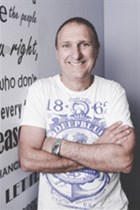
Related
Top stories






More news













Ian Bremmer is what you would call a man of influence. The 43-year-old political scientist who specialises in global political risk is a professor at Columbia University and is the founder of the Eurasia Group, whose clients are Fortune 500 companies.
The author of eight books, including a bestseller called "Every Nation for Itself: Winners and Losers in a G-Zero World" (Portfolio, May 2012), Bremmer also wrote "The J Curve: A New Way to Understand Why Nations Rise and Fall" (Simon & Schuster, 2006) which The Economist chose as one of the best books of the year for 2006.
The political scientist is also a columnist for the UK Financial Times, Reuters.com and ForeignPolicy.com; and has been published in the Washington Post, The New York Times, The Wall Street Journal, Harvard Business Review, and Foreign Affairs. It was Bremmer's column in Foreign Policy - 'The Call' - that grabbed my attention.
In a series of columns on global risks for 2013, comes Bremmer's 'Risk #10: South Africa'. In short the piece says President Jacob Zuma's re-election at Mangaung will hasten the decline of the ANC while increasing social pressures on what he calls "the continent's most advanced economy". Bremmer says the ANC policy of strategic state ownership introduces policy uncertainty to mining, and that National Development Plan (NDP) is an intervention that's "too little, too late". Bremmer concludes by saying marginalised South Africans being continually asked to wait to achieve a better future, are running out of patience.
Whether you agree with Bremmer's indictment on development and stability in SA or not, you can't dispute the man's reach and influence. But let's abandon Foreign Policy, and have a look at New Statesman where Martin Plaut, former BBC editor and author of "Who rules South Africa?" reveals that SA has become a major conduit for cocaine. In The New York Times there's the story about the Mozambique national brutalised to death by police.
Don't shoot me for being a messenger of doom and gloom, but SA is increasingly being portrayed in global media as a wanting, violent nation, a perception only exacerbated by the Oscar Pistorius murder trial. This has a direct impact on Brand South Africa and concerns the significant amount spent by the organisation responsible for growing this country's global brand. A quick look at Brand South Africa's financials for the 2011/2012 financial year shows that some R 173,133 million was spent trying to buoy and build our brand reputation.
The question is, given the structural challenges our country is facing, is this money well spent? An immutable law of branding is that when you advertise, promote or publicise a dysfunctional product and service all you do is hasten its decline. This is not a matter of being an optimist or a pessimist, but is a reality that people who work in branding and advertising know all too well.
The massive problem is that the international media is all 'man bites dog' which speaks to the inherent nature of news, but what the successes, breakthroughs and endeavours which are South African too? And there's a mass of good news to be celebrated, the problem is that it is being drowned in the see of doom and gloom.
March 2013 saw The Procter and Gamble Company (P&G) announce new investment of over R1.6 billion locally which will see massive expansion in P&G's South African manufacturing operations. The latest investment is in addition to the 2009 investment of a Johannesburg plant of some R500 million.
With the International Monetary Fund declaring that banks in Europe are still fragile, comes the local news that SA's major banks are remaining resilient. The financial results of this country's four major banks (namely Absa, FirstRand, Nedbank and Standard Bank) have showed resilience despite the recent global economic turmoil. A report by PWC showed that unlike their European counterparts, SA's big banks are strong, well-capitalised and are performing solidly.
A report by the Organisation for Economic Co-operation and Development (OECD) released in Johannesburg showed this country had made some progress (although we were urged to step up economic reform); house prices have increased over the past year; there's a steady influx of European pensioners to this country; Denmark is helping this country to fund renewable energy; while CSIR Researchers have developed the world's first injectable medicine from a tobacco plant - this is a rabies antidote that could change the way the deadly viral disease is treated globally.
SA's structural dilemmas and the dichotomy of 'good' and 'bad' news that flows from this country presents a challenge for Brand South Africa, which is directly aligned to government and reports to Collins Chabane in the Presidency. There's a massive need for Brand SA to become more independent, and play more of a 'watch dog' role internally and I believe its proximity to the presidency and government hinders this. Brand SA belongs to all South Africans and therefore it makes more sense for it to report to parliament.
My view is that the closeness between Brand South Africa and The Presidency doesn't enable the objectivity required to adequately view the structural problems that this country faces and to aggressively lobby for 'product improvement'.
At the same time to get real value from the nearly R200 million it will spend on promoting this country in 2013, Brand SA needs to work a lot harder to mitigate the influence and reach of global media that positions SA as a risk. The good news and great South African stories are abundant, but they need to be actively promoted across the world to break the current cycle of bad news. Brand SA - there's a problem with this country's reputation. It's time to make a change.
